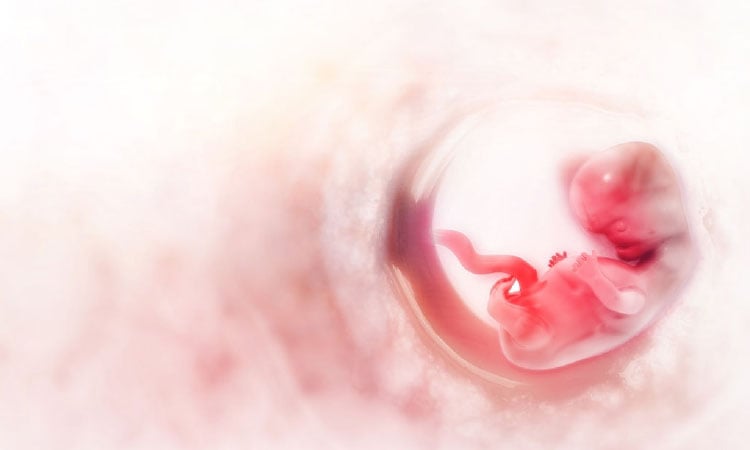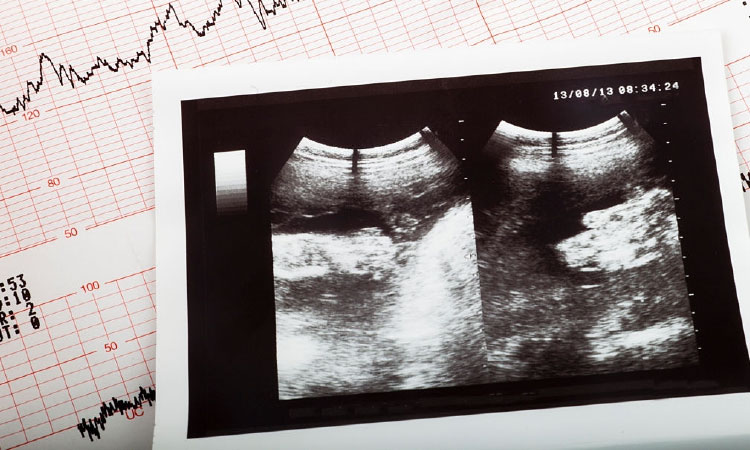The feeling of hearing your little one’s heartbeat in the first ultrasound is beyond words. But what if you couldn’t detect a fetal heartbeat in ultrasound or with baby Doppler? Is there a possibility that fetal heartbeat stopped suddenly? Unfortunately, yes.
A missed miscarriage typically refers to a miscarriage where the embryo dies but the mother does not know about it, as typical signs of miscarriage do not show up. There is little or no vaginal bleeding or painful cramps because the body hasn’t yet expelled it. Such a miscarriage is usually detected during ultrasound tests, which are common throughout pregnancy. And there, the heartbreaking news of no fetal heartbeat detected is broken to you.
First of all, don’t panic if you fail to hear the fetus’s heartbeat with a baby Doppler. Although many people claim to hear their baby’s heartbeat as early as eight weeks, different factors determine when the fetus’s heartbeat becomes audible.
Position of the placenta, the time you choose to hear the heartbeat, the type of ultrasound, tilt of uterus, etc., determines how fast you can hear the fetal heartbeat. Besides, incorrectness in calculating the gestational age can also result in not detecting fetal heartbeat.
More often, a physician would able to find the baby’s heartbeat with a baby Doppler by the end of the first trimester. Most women have scheduled ultrasounds at about 8.5 weeks and go into panic if fetal heartbeat is not detected at 9 weeks. This happens because we view a pregnancy as successful unless there are signs of miscarriage. WebMD claims that “Dopplers can’t reliably detect a baby’s heartbeat until 10-12 weeks“, explaining the case of no heartbeat at 9 weeks.
However, if the physician cannot detect fetal heartbeat even after 12 weeks, it may be worth further examination.
Detecting fetal heartbeat on the first ultrasound is one of the surest signs that a pregnancy is going on as it should. Usually, by the time you go for your first ultrasound, the miscarriage risk will be much lower. You also might be having all the signs of pregnancy, and you might not be experiencing anything unusual.
But then, the inability to detect the heartbeat can be distressing, especially since everything else appears to be ok. However, fetal heartbeat stopping suddenly is more common than you think.
Calculate Due Date With LMP
Many ladies who get positive pregnancy test results and start to have prenatal vitamins and folic acid prescribed by gynecologists have had the unfortunate experience of learning about no fetal heartbeat during the first ultrasound.
Related Reading: 10 Common Causes Of Miscarriage
Everything About Missed Miscarriage
According to our panel gynaecologist Dr Ankita Patel Tayal, a missed miscarriage or a silent miscarriage happens when the baby has died in the womb. At the same time, the mother may not exhibit or experiences some clear signs of miscarriage- such as vaginal bleeding, cramping, or vaginal discharges.
Sometime in the first trimester, usually around 6 to 10 weeks, the embryo quit developing, and the heartbeat stopped.
Missed miscarriage is usually detected during a routine ultrasound scan when the doctor is not able to find a heartbeat or when the fetus is too small for the gestational age. Just about 1-5% of all pregnancies are found to end in a missed miscarriage.
It comes as a big shock due to the lack of usual signs of miscarriage, such as bleeding and pain. According to a study, about three percent of documented pregnancies end in a missed miscarriage.
Why am I not able to sense something wrong even after the baby dies in the womb?

Even after the fetal heartbeat stops, the body may not be able to detect the pregnancy loss. As a result, the pregnancy hormones will continue to be produced and released by the placenta. All pregnancy signs are there and you are not aware of the loss.
Thus, during the first trimester’s early weeks, an expecting mother will continue to experience all the signs of pregnancy like nausea, morning sickness, tiredness, etc. Along with the “feeling of pregnancy,” the pregnancy test may also show positive.
Likewise, the first few weeks of the second trimester are too early to experience the baby kicks. Therefore, due to the lack of bleeding or pain, no wonder an expecting women likely to assume all is well.
As a result, other than detecting the lack of fetal heartbeat in an ultrasound scan, there is no way the mother should know she had a missed miscarriage.
How the scanning of the missed miscarriage looks?
If you scanned with a missed miscarriage, the scan picture generally shows a pregnancy sac with an embryo or fetus inside. However, there will be no heartbeat, and the fetus appears smaller than it should be at this stage.
On the other hand, some scans show an empty pregnancy sac or no clear sac at all. This happens when either the embryo has not developed or stopped developing at a very early stage.
When the embryo that stopped developing, it will be more often reabsorbed by the body. That is why the scan shows the empty sac.
How is missed miscarriage diagnosed?
Usually, the doctor diagnoses missed miscarriage during the routine prenatal checkup. Sometimes, if the prenatal checkup is performed earlier – around (8 or 9 weeks), it might not always be possible to detect the fetal heartbeat.
In that case, the doctor will evaluate the hCG level in blood. Normally, its level should double every two to three days during the initial weeks of the pregnancy. If the level has not increased enough, and the ultrasound fails to detect a heartbeat, the doctor may take it as a missed miscarriage sign.
Related Reading: 12 Foods You Should Eat After Miscarriage For Fast Recovery
They usually schedule a follow-up ultrasound in a week’s time to see if they could find the heartbeat. If they can’t, they will declare a missed miscarriage. Now the doctor declares either that the pregnancy sac is empty or that the embryo has no heartbeat.
On the other hand, if the scanning is performed after the 20th week, and no heartbeat is detected, they could confirm missed miscarriage without any further test.
What Causes Fetal Heartbeat To Stop?
Reasons for fetal heartbeat stopping suddenly are not always detected. As already mentioned, it could be nature’s way of rejecting the unfitted ones. Some other reasons that could bring about the fetal heartbeat to stop suddenly are:
1. Chromosomal abnormality can bring about the fetal anomaly. An abnormal fetus fails to develop, and its heartbeat stops eventually as the pregnancy progresses
2. Blood clotting disorder of the mother creates clots in the veins of the placenta or umbilical cord. This blocks the nutrients and blood and oxygen towards the fetus, bringing about the fetal heartbeat to stop
3. Twisting of cord around the neck or knotted umbilical cord, hyper coiled or hypo coiled umbilical cord can be the reason for the fetal heartbeat to stop after 20th week of pregnancy
4. Low level of Progesterone hormone can stop the fetus’s growth and development, making the fetus heartbeat to stop
5. Infections of the mother, such as rubella, toxoplasmosis, TORCH, cytomegalovirus, parvovirus, etc., can bring about the stopping of the fetal heartbeat. Even though many infections may not potentially harm the mother, it might adversely affect the embryo during the early pregnancy stages
What Are The Symptoms Of Fetal Heartbeat Stopping?

Once you are tested positive for pregnancy, you will be experiencing pregnancy symptoms like fatigue, morning sickness, tenderness in the breast, and nausea.
However, once the fetal heartbeat stops, eventually, the intensity of these signs start to disappear. Some women reported experiencing brownish discharge as well.
Yet, as these signs can be subtle, more often, the mothers fail to find out that anything’s wrong until the first ultrasound scan.
Related Reading: 6 Causes And 5 Ways To Deal With Weight Loss After Miscarriage
What Can Be Done When Fetal Heartbeat Stops Suddenly?

Dr Ankita Patel Tayal, MD obstetrician & gynaecologist, says that if your sonographer doubts a missed miscarriage, she’ll need to confirm with another scan. This will be scheduled in a week’s time. This time, they will perform a vaginal scan, which will not miss the fetus’s heartbeat, if present.
However, once the condition is confirmed, there are three options before deciding further steps. The doctor will discuss these options with the woman and her family and suggest a treatment he/she feels is best for her.
The doctor will also give her some time for the diagnosis to sink in and think about what she wants to do. All women should be given these choices. The three options are:
1. Expectant management
This option is a “wait and see” attitude. Generally, if a missed miscarriage is left as it is, the embryonic tissue will be pushed out by the uterus itself. This means the women will miscarry naturally.
This attitude works well in more than 65% of missed miscarriages. In case this approach fails to work, there are two other options to rely on
Related Reading: 18 Foods That Can Cause Miscarriage In Early Pregnancy
2. Medical management
This is a noninvasive method for the completion of the miscarriage. Here, the doctor suggests taking a medication called misoprostol. This medication helps to induce miscarriage and thereby to push out the remaining fetal tissue.
Misoprostol can be administered in two ways – either sublingual (put under the tongue) or vaginal. The woman can take the medication at the doctor’s office or hospital. After the administration of this medicine, no hospitalization is required.
The time for the discharge varies significantly. It might happen within hours, or it might take a few weeks. Once the bleeding starts, it may last more than two weeks. However, usually, the uterine contraction starts within a few hours of administrating medicine
3. Surgical management
Sometimes, especially if both the above strategies fail or the missed miscarriage happens after the 20th week of pregnancy, the fetus will be too big to get miscarried. In such a case, surgical procedures would likely be needed to remove the fetal tissue from the uterus.
A procedure called ‘D and C’ will be initiated if the doctor doubts some tissue remains in the uterus after letting it be naturally miscarried or after inducing miscarriage by administrating medicine
Conclusion
Many a time, the news of no fetal heartbeat comes as a shock due to the lack of signs. However, there is no need for any sort of guilt feelings as to why the baby’s heartbeat stopped during pregnancy. It is not your fault, and there is nothing you can do, not any drugs or precautions could have prevented what happened.
In any given instance, around 30% of sperms could be abnormal. The same logic is applicable to eggs as well. Not all the eggs discharged every month are normal, especially when it comes to women in their thirties.
Obviously, when an abnormal sperm or egg mates, you can’t expect to conceive a normal fetus. Stopping the heartbeat is a way of implementing natural selecting (surviving the fittest). It is nature’s choice to call off the pregnancy rather than having an abnormal child.
Nature considers an abnormal embryo as a reproductive wastage, and eliminating it is an unavoidable event in nature. It is not possible to prevent these early abortions. And even if we could, never try it and let nature play its part on its own.
FAQs
ideally, a variation in fetal heart rate can cause the heartbeat to be detected at one instance and not there at another. This could be due to human error, movement of the baby and even if your dates are incorrect. Uterus and placenta conditions, being overweight, Chromosomal abnormalities and infections can also make a fetal heartbeat to disappear and reappear again.
Yes. Certain cases of anterior placenta, uterus abnormalities and your stage of pregnancy can sometimes make it difficult for the doctor to detect a fetal heartbeat accurately.


